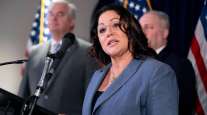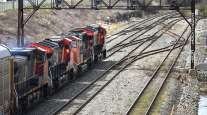Union Pacific Profit Beats Estimates Amid Cost Cutting

Union Pacific Corp. reported first-quarter earnings higher than analysts’ expectations as the railroad cut costs and boosted prices to mitigate a steep drop in cargo demand, pushing shares to their highest value in five months.
Earnings declined to $1.16 a share from $1.30 a year earlier, the company said in a statement April 21. That beat the $1.10 average of 25 analysts’ estimates compiled by Bloomberg News.
Core pricing increased 2.5%, easing the impact of an 8% drop in freight volume. The company reduced its workforce by 5,175 from a year earlier and has put 1,400 locomotives in storage to adjust to the reduced shipping.
“The commercial team really did an excellent job of securing 2.5% price in an environment where volume is down 8%,” CEO Lance Fritz said in an interview. “There are a lot of headwinds, as you can imagine in those conversations.”
Weakening demand for coal contributed to a 14% decline in first-quarter revenue to $4.83 billion. Large U.S. railroads shipped 33% fewer carloads of coal during the first quarter, pushing down total rail traffic by 6.5%, according to the Association of American Railroads’ weekly data.
Low natural-gas prices, stricter environmental rules and one of the warmest winters on record have driven down coal demand.
The decline in coal is “about as broad and significant as we’ve seen,” Fritz said. “While I won’t call a bottom, I’ll say we have a significant amount of headwinds that I would hope aren’t in place for the foreseeable future, forever.”
Union Pacific’s coal carloads fell 34% in the quarter, and shipments of industrial products dropped 10%. Automotive freight, one of the few bright spots for railroads, rose about 7%.
The decline in cargo isn’t letting up. Union Pacific predicted that second-quarter volume would be down 10%, led lower by coal. The full-year percentage decline for cargo will be in the “mid-single digit” range, the railroad said.
To crimp costs, the railroad cut its 2016 capital expenditures plan by 2%, dropping it by $75 million to $3.675 billion. Operating expenses declined 14% even as Union Pacific grappled with flooding that shut down track during the quarter.
“We were particularly impressed with UNP’s cost performance given inclement weather in the southern U.S. in March, and constrained service performance last month,” Deutsche Bank AG analyst Robert Salmon said in a note.




